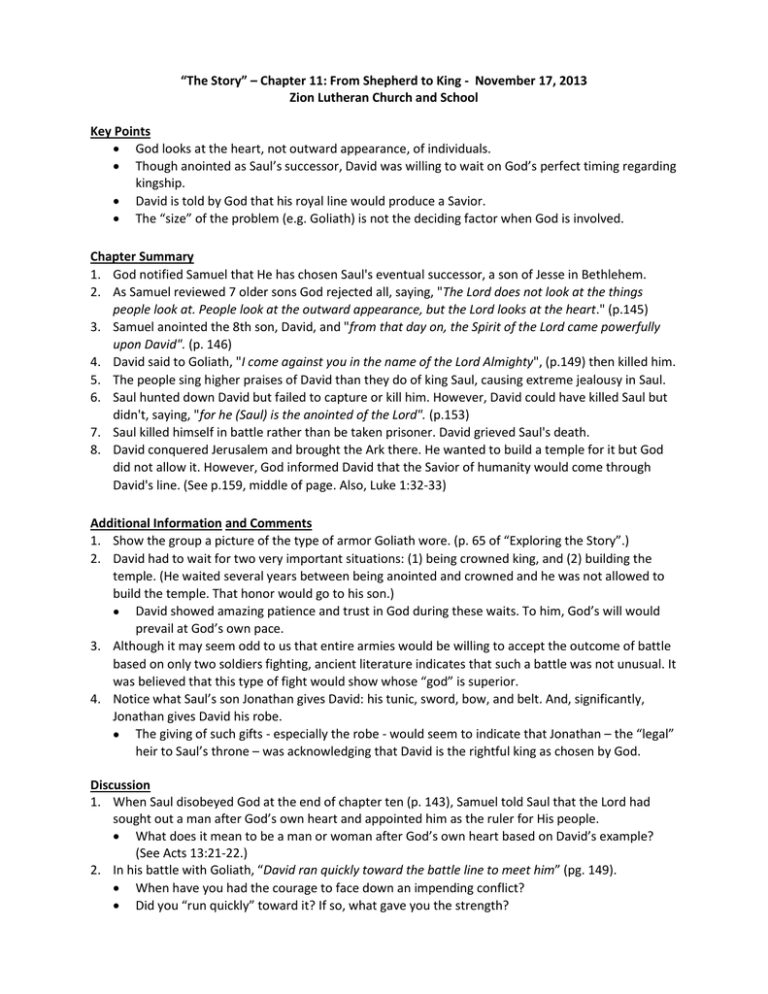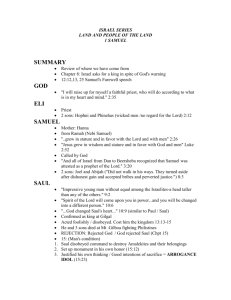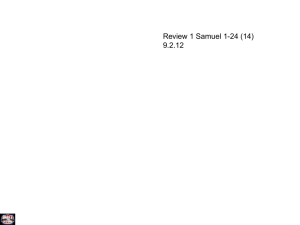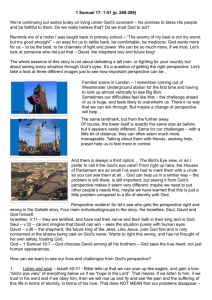Story Notes Chapter 11 - Zion Lutheran Church and School
advertisement

“The Story” – Chapter 11: From Shepherd to King - November 17, 2013 Zion Lutheran Church and School Key Points God looks at the heart, not outward appearance, of individuals. Though anointed as Saul’s successor, David was willing to wait on God’s perfect timing regarding kingship. David is told by God that his royal line would produce a Savior. The “size” of the problem (e.g. Goliath) is not the deciding factor when God is involved. Chapter Summary 1. God notified Samuel that He has chosen Saul's eventual successor, a son of Jesse in Bethlehem. 2. As Samuel reviewed 7 older sons God rejected all, saying, "The Lord does not look at the things people look at. People look at the outward appearance, but the Lord looks at the heart." (p.145) 3. Samuel anointed the 8th son, David, and "from that day on, the Spirit of the Lord came powerfully upon David". (p. 146) 4. David said to Goliath, "I come against you in the name of the Lord Almighty", (p.149) then killed him. 5. The people sing higher praises of David than they do of king Saul, causing extreme jealousy in Saul. 6. Saul hunted down David but failed to capture or kill him. However, David could have killed Saul but didn't, saying, "for he (Saul) is the anointed of the Lord". (p.153) 7. Saul killed himself in battle rather than be taken prisoner. David grieved Saul's death. 8. David conquered Jerusalem and brought the Ark there. He wanted to build a temple for it but God did not allow it. However, God informed David that the Savior of humanity would come through David's line. (See p.159, middle of page. Also, Luke 1:32-33) Additional Information and Comments 1. Show the group a picture of the type of armor Goliath wore. (p. 65 of “Exploring the Story”.) 2. David had to wait for two very important situations: (1) being crowned king, and (2) building the temple. (He waited several years between being anointed and crowned and he was not allowed to build the temple. That honor would go to his son.) David showed amazing patience and trust in God during these waits. To him, God’s will would prevail at God’s own pace. 3. Although it may seem odd to us that entire armies would be willing to accept the outcome of battle based on only two soldiers fighting, ancient literature indicates that such a battle was not unusual. It was believed that this type of fight would show whose “god” is superior. 4. Notice what Saul’s son Jonathan gives David: his tunic, sword, bow, and belt. And, significantly, Jonathan gives David his robe. The giving of such gifts - especially the robe - would seem to indicate that Jonathan – the “legal” heir to Saul’s throne – was acknowledging that David is the rightful king as chosen by God. Discussion 1. When Saul disobeyed God at the end of chapter ten (p. 143), Samuel told Saul that the Lord had sought out a man after God’s own heart and appointed him as the ruler for His people. What does it mean to be a man or woman after God’s own heart based on David’s example? (See Acts 13:21-22.) 2. In his battle with Goliath, “David ran quickly toward the battle line to meet him” (pg. 149). When have you had the courage to face down an impending conflict? Did you “run quickly” toward it? If so, what gave you the strength? 3. What was the fundamental reason for David’s choice to spare Saul’s life in their encounter at EnGedi (p. 153-154)? How does this choice reflect David’s view of submission and of God? 4. Pages 156-158 describe David’s exuberance at having the Ark brought to Jerusalem. Do you recall a time when you felt ”exuberance” in worship? Would you characterize your own typical worship as reserved or unbridled? (We’re Lutherans so let’s consider the question to be within the bounds of what passes for Lutheran exuberance.) 5. In humility, David offered to build a house for God, but instead God promised to build a “house” for David. What prompted David’s concern for God’s dwelling place? 6. God passed over 7 of David’s brothers – including those who “looked” like royal material - before telling Samuel that the “runt” was to be anointed king of Israel. Can you think of a situation where you made an initial, snap, judgment about someone only to later find that you were mistaken? 7. Read aloud the prayers of David recorded on pages 152 and 154-155. What do we learn about David’s heart from these prayers? 8. Supplemental materials for “The Story” use the illustration of a boot camp to describe how God prepared David to be king. Can you think of a time when, looking back, you can see that God was doing something similar to you? i.e. preparing you for service to Him through trial and difficulty? 9. David had to wait several years between the time he was anointed as the future king and when he was crowned king. Have you ever experienced a situation where you knew you were being called to do something for God but were not able or allowed to for a long period? 10. An author of “Story” materials states that God can use disobedient lives/actions as well as obedient ones to accomplish His will. Do you agree? If so, can you think of an example? 11. We should follow God’s example of looking at “the heart” of our fellow human beings instead of at outward appearances. Since we can’t see into a person’s heart, what traits might we look for that would show that a person is one who is “after God’s own heart”? (As much as we can, anyway.) Summary 1. God looks through the hype and outward appearance that often easily fool people and, instead, looks at the heart. 2. David trusted God thoroughly as shown in many instances. Possibly the most striking example was when David had the opportunity to kill Saul - who was trying very hard to kill David - but did not. Instead he bowed down and offered Saul his life. (Saul not only spared David's life, he acknowledged that David would be his successor.) For Next Week 1. Pray for God to give you the ability to see beyond “first impressions”; that you will see the person as God sees him/her. (As much as what is humanly possible, anyway.) 2. Pray that God will give strength and comfort to those waiting for an outcome or for a situation to improve. 3. Ask God to continue refining you and making you grow into someone who is a “man/woman after God’s own heart”.






